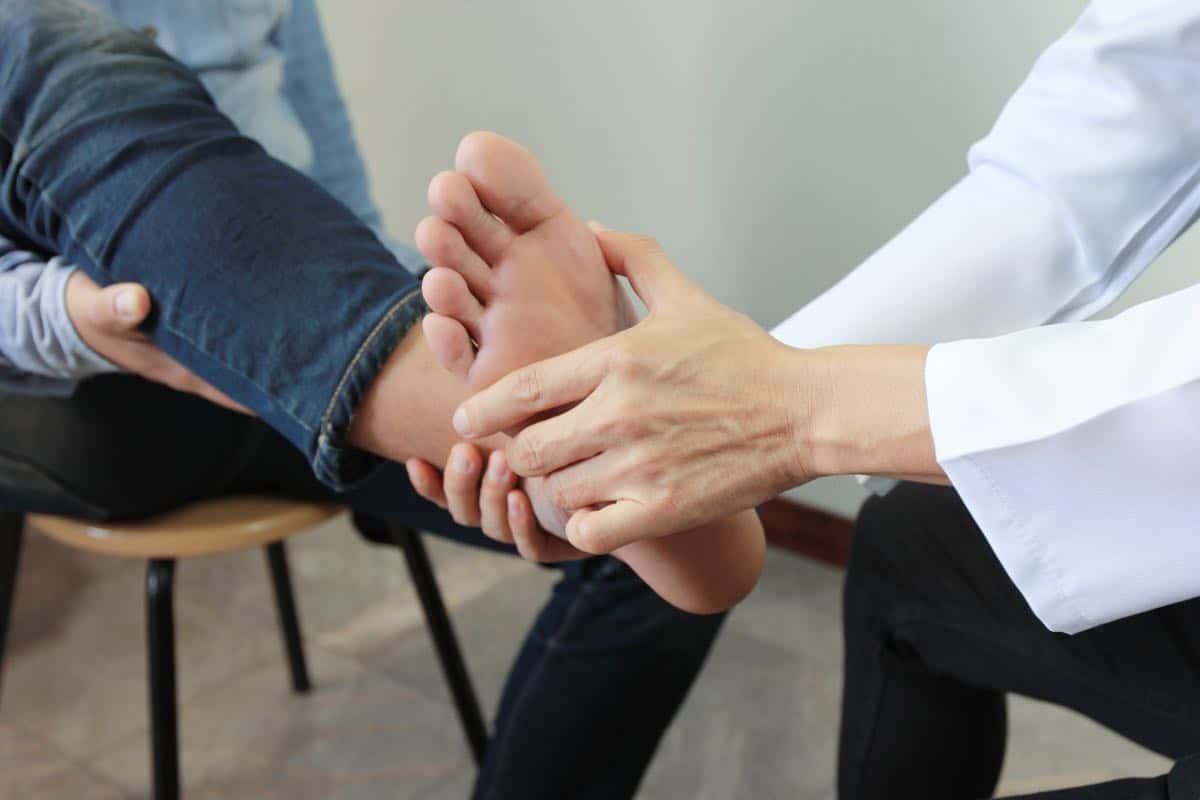Foot drop is a health issue that identifies a weakening of the muscles that allow ankle and toe flexing. This health issue causes the patient to drag the front part of the foot when walking. To compensate for this dragging, the patient will often flex the knee to raise the foot higher than in a standard stride, frequently referred to as a high steppage gait.
Foot drop generally affects the muscles moving the ankle and foot upward, especially the anterior tibialis, the extensor halluces longus, and the extensor digitorum longus. Although foot drop is a neuromuscular disorder affecting muscles and nerves, it’s not a disease. It is a symptom of an underlying, perhaps spinal, health issue.
Table of Contents
What are the Symptoms of Foot Drop?
The most well-known symptom of foot drop, high steppage gait, is commonly characterized by raising the thigh up in an exaggerated manner while walking, similar to climbing the stairs. High steppage gait is associated with one of the following:
- Dragging of the foot and toes
- Scraping of the toes throughout the floor
- Uncontrolled slapping of the toes against the floor
The affected muscles are often utilized to maintain the foot off the ground during the swing-through phase of walking. If these are weak, they can’t maintain the foot up, and the foot will scrape throughout the floor if it is not raised high. Aside from the common symptoms above, additional problems typically associated with foot drop can ultimately include:
- The inability to raise the foot at the ankle
- The inability to point the toes upward in the human body is frequently referred to as dorsiflexion.
- Struggling to walk normally in a heel-to-toe manner
Other well-known symptoms also associated with foot drop may ultimately include one or a combination of the following:
- Excessive, swinging hip motion. With foot drop, the hip may swing out to prevent the toes from hitting the floor.
- Limp foot. The affected foot may flop away from the individual.
- Pain, tingling sensations, and numbness in the foot. The intensity of the symptoms can vary from person to person. Symptoms can make regular tasks, such as walking or driving, difficult. Foot pain may be associated with sciatica.
- Difficulty engaging in exercise and/or physical activities requires using the front of the foot. By way of instance, climbing stairs may become challenging for patients with foot drop.
- Muscle atrophy in the lower extremities. Muscle atrophy refers to a muscle decreasing in mass and weakening. Because the anterior tibialis, the extensor halluces longus, and the extensor digitorum longus muscles are affected by foot drop, muscle atrophy may occur and make it more challenging to exert force in the lower extremities.
- Foot drop may be experienced in one or both feet. Foot drop is generally experienced in a single foot.
What are the Causes of Foot Drop?
Foot drop is a symptom of an underlying health issue. Foot drop causes fall into one or a combination of three categories:
- Muscle damage or injury
- Skeletal or anatomical abnormalities affecting the foot
- Nerve damage
Specific conditions or diseases and other health issues which may cause foot drop may also include:
- A lumbar spine health issue
- A stroke or tumor
- Parkinson’s disease
- Diabetes
- Motor neuron disease
- Multiple sclerosis
- Adverse reactions to drugs and/or medications, as well as alcohol
- An injury to the leg or foot
Various lumbar spine health issues can ultimately affect the nerve roots, including the peroneal and sciatic nerves. Any compression or impingement of the nerve roots in the lower back may cause foot drop. Common lower back or lumbar spine health issues which can cause foot drop and a variety of other symptoms, such as sciatica, may include:
- Lumbar herniated disc
- Lumbar spinal stenosis
- Spondylolisthesis
- Bone fractures or lacerations
It should be known that determining the underlying cause of foot drop is often necessary to be able to treat it effectively.
How is Foot Drop Diagnosed?
Foot drop is generally diagnosed through a physical evaluation. The healthcare professional will watch the patient walk and check their leg muscles for weakness. The doctor should also check for pain, tingling sensation, and numbness in the foot.
Imaging Tests
Foot drop is sometimes caused by an overgrowth of bone in the spinal canal or by a tumor or cyst pressing on the nerve roots in the lumbar spine. Imaging tests will help pinpoint these kinds of health issues. These imaging tests can include the following:
- X-rays. Plain X-rays utilize minimal radiation to show a soft tissue mass or bone lesion.
- Ultrasound. This technology, which utilizes sound waves to create images of internal structures, may check for tumors or cysts on the nerves or demonstrate swelling on the nerves due to compression or impingement.
- CT scan. This combines X-ray images from distinct angles to form cross-sectional perspectives of structures.
- Magnetic resonance imaging or MRI. This test utilizes radio waves and a strong magnetic field to produce detailed images. MRI is very useful in showing soft tissue lesions that may irritate a nerve.
Nerve Tests
Electromyography, or EMG, and nerve conduction studies measure electrical activity in the muscles and nerves. These tests can be uncomfortable, but they help determine the region of the damage or injury along the affected nerve.
What is the Treatment for Foot Drop?
Treatment for foot drops depends on the cause of the health issue. If the cause is successfully treated, foot drop may improve or even disappear. If the cause can’t be treated, foot drop may be irreversible. Treatment for foot drop may include:
- Braces or splints. A brace or splint on your ankle and foot which fits a shoe can maintain the foot in a normal position.
- Chiropractic care or physical therapy. Alternative treatment options, including stretches and exercises, can help strengthen the lower extremities and their range of motion which may improve gait problems associated with foot drop. Stretching stretches and exercises are especially important to protect against stiffness in the heel. The healthcare professional may also provide custom foot orthotics for support, stability, and shock absorption.
- Nerve stimulation. Occasionally stimulating the nerve which lifts the foot can help improve foot drop.
- Surgery. Surgical interventions may be useful depending on the cause and if the patient’s foot drop is comparatively new. Suppose the patient’s foot drop is long-standing. In that case, the healthcare professional may suggest surgery that fuses the ankle and foot bones or a process that transfers an attached muscle and tendon to another region of the foot.

Foot drop is a health issue in which the raising of the front part of the foot is difficult. Foot drop is not a condition or disease but rather, a symptoms of an underlying health issue. Muscle and/or nerve damage caused by injury and/or an aggravated health issue, such as a lumbar herniated disc, spinal stenosis, spondylolisthesis, and/or fractures can ultimately cause foot drop. These health issues can also cause low back pain and sciatica as well as other painful symptoms. – Dr. Alex Jimenez D.C., C.C.S.T. Insight
Low Back Pain
Additional Topic Discussion: Foot Orthotics
Low back pain and sciatica are common health issues that affect many individuals worldwide. However, did you know that chronic pain may be due to foot problems? Health issues originating in the foot may ultimately cause imbalances in the spine, such as poor posture, which can cause the well-known symptoms of low back pain and sciatica. Custom foot orthotics, individually designed with 3-arch support, can help promote overall health and wellness by supporting and promoting good posture and correcting foot problems. Custom foot orthotics can ultimately help improve low back pain and sciatica.
Formulas for Methylation Support
XYMOGEN’s Exclusive Professional Formulas are available through select licensed healthcare professionals. The internet sale and discounting of XYMOGEN formulas are strictly prohibited.
Proudly, Dr. Alexander Jimenez makes XYMOGEN formulas available only to patients under our care.
Please call our office for us to assign a doctor consultation for immediate access.
If you are a patient of Injury Medical & Chiropractic Clinic, you may inquire about XYMOGEN by calling 915-850-0900.
 For your convenience and review of the XYMOGEN products, please review the following link.*XYMOGEN-Catalog-Download
For your convenience and review of the XYMOGEN products, please review the following link.*XYMOGEN-Catalog-Download
* All of the above XYMOGEN policies remain strictly in force.
Post Disclaimer
Professional Scope of Practice *
The information on this blog site is not intended to replace a one-on-one relationship with a qualified healthcare professional or licensed physician and is not medical advice. We encourage you to make healthcare decisions based on your research and partnership with a qualified healthcare professional.
Blog Information & Scope Discussions
Welcome to El Paso's Premier Wellness and Injury Care Clinic & Wellness Blog, where Dr. Alex Jimenez, DC, FNP-C, a board-certified Family Practice Nurse Practitioner (FNP-BC) and Chiropractor (DC), presents insights on how our team is dedicated to holistic healing and personalized care. Our practice aligns with evidence-based treatment protocols inspired by integrative medicine principles, similar to those found on this site and our family practice-based chiromed.com site, focusing on restoring health naturally for patients of all ages.
Our areas of chiropractic practice include Wellness & Nutrition, Chronic Pain, Personal Injury, Auto Accident Care, Work Injuries, Back Injury, Low Back Pain, Neck Pain, Migraine Headaches, Sports Injuries, Severe Sciatica, Scoliosis, Complex Herniated Discs, Fibromyalgia, Chronic Pain, Complex Injuries, Stress Management, Functional Medicine Treatments, and in-scope care protocols.
Our information scope is limited to chiropractic, musculoskeletal, physical medicine, wellness, contributing etiological viscerosomatic disturbances within clinical presentations, associated somato-visceral reflex clinical dynamics, subluxation complexes, sensitive health issues, and functional medicine articles, topics, and discussions.
We provide and present clinical collaboration with specialists from various disciplines. Each specialist is governed by their professional scope of practice and their jurisdiction of licensure. We use functional health & wellness protocols to treat and support care for the injuries or disorders of the musculoskeletal system.
Our videos, posts, topics, subjects, and insights cover clinical matters and issues that relate to and directly or indirectly support our clinical scope of practice.*
Our office has made a reasonable effort to provide supportive citations and has identified relevant research studies that support our posts. We provide copies of supporting research studies available to regulatory boards and the public upon request.
We understand that we cover matters that require an additional explanation of how they may assist in a particular care plan or treatment protocol; therefore, to discuss the subject matter above further, please feel free to ask Dr. Alex Jimenez, DC, APRN, FNP-BC, or contact us at 915-850-0900.
We are here to help you and your family.
Blessings
Dr. Alex Jimenez DC, MSACP, APRN, FNP-BC*, CCST, IFMCP, CFMP, ATN
email: coach@elpasofunctionalmedicine.com
Licensed as a Doctor of Chiropractic (DC) in Texas & New Mexico*
Texas DC License # TX5807
New Mexico DC License # NM-DC2182
Licensed as a Registered Nurse (RN*) in Texas & Multistate
Texas RN License # 1191402
ANCC FNP-BC: Board Certified Nurse Practitioner*
Compact Status: Multi-State License: Authorized to Practice in 40 States*
Graduate with Honors: ICHS: MSN-FNP (Family Nurse Practitioner Program)
Degree Granted. Master's in Family Practice MSN Diploma (Cum Laude)
Dr. Alex Jimenez, DC, APRN, FNP-BC*, CFMP, IFMCP, ATN, CCST
My Digital Business Card



